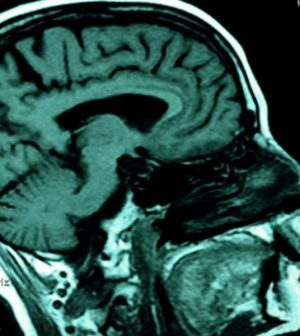- Could Your Grocery Store Meat Be Causing Recurring UTIs?
- Are You Making This Expensive Thermostat Error This Winter?
- Recognizing the Signs of Hypothyroidism
- 10 Strategies to Overcome Insomnia
- Could Artificial Sweeteners Be Aging the Brain Faster?
- Techniques for Soothing Your Nervous System
- Does the Water in Your House Smell Funny? Here’s Why
- Can a Daily Dose of Apple Cider Vinegar Actually Aid Weight Loss?
- 6 Health Beverages That Can Actually Spike Your Blood Sugar
- Treatment Options for Social Anxiety Disorder
HIV Lurking in Spinal Fluid Linked to Thinking Problems

— (HealthDay News) Even with long-term treatment, HIV can still be found in the cerebrospinal fluid of some people with the AIDS-causing virus, a new study reports.
And these patients are at increased risk of having thinking problems, the researchers say.
“It is difficult to target infections that lurk in the brain, and HIV is probably not an exception to the rule,” said study senior author Dr. John Mellors, chief of infectious diseases at the University of Pittsburgh.
“We have our work cut out for us in the quest for an HIV cure, but knowing is half the battle, so I’m cautiously optimistic,” he said in a university news release.
Researchers analyzed cerebrospinal fluid from 69 people with HIV who had been on anti-HIV therapy for an average of nine years. The study found that nearly half the participants had cells harboring HIV.
Of those who had HIV-harboring cells in their cerebrospinal fluid, 30% met criteria for thinking problems (cognitive impairment), compared with 11% of those without HIV-harboring cells in their cerebrospinal fluid.
The findings may help explain why people with well-controlled HIV can have memory and concentration problems and difficulty completing complex tasks, according to the researchers.
They also said that the results show that the brain is an important reservoir for HIV, a challenge that needs to be considered in clinical trials of potential cures.
“I don’t know of a single infectious disease that is easier to treat when it’s in the brain than when it’s elsewhere in the body,” Mellors said.
The researchers noted that the study does not prove that the presence of HIV-harboring cells in spinal fluid causes cognitive impairment. There could be several explanations for the findings, they noted.
For example, it’s possible that the level of original HIV infection in the nervous system was higher in patients with HIV-harboring cells, or that the mental problems may have started early in the HIV infection, before the start of anti-HIV therapy.
However, knowing about a possible link between even well-controlled HIV infection and thinking issues can help doctors track patients who may need additional monitoring, Mellors said.
The study was published July 15 in the Journal of Clinical Investigation.
More information
The U.S. Centers for Disease Control and Prevention has more on HIV/AIDS.
Source: HealthDay
Copyright © 2026 HealthDay. All rights reserved.










